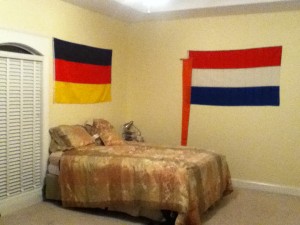The Netherlands and Germany are two countries that could not oppose each other in certain ways: soccer, language, some cultural traits, morals, fashion styles… But they also find harmony. There are many activities that connect both countries. Not only economically. I grew up in a small German town on the Dutch border and went to school in the Netherlands every day. My mother is Dutch, my father is German, and I am… both. Which makes quite an interesting mix. When Germany plays the Netherlands in soccer, or they play in the same championship, I am often asked the question: what team do you support? To be very honest with you, I support the German team. For no sensible reason. I just do. Now that we are world champion, I guess I made the right choice!
Also in language, I notice many differences – and similarities. Did you know, for example, that the German genitiv is the same as the old Dutch genitiv, that nobody uses anymore but everybody knows? It goes like this:
NL: de heer des huizes;

My room in the US!
D: der Herr des Hauses;
E: the man of the house.
This holds true for all forms! Amazing, isn’t it?
I myself tend to make some strange mistakes when I speak either of the languages. In Dutch, I incorporate literally translated German words or sentence constructions, and in German I do the same. An example:
NL: Ik heb het wel gedaan!
D: Ich habe es wohl getan!
E: I did do it!
Guess which one is wrong?
The German wohl is wrong, but it does not sound very wrong to me, because I am used to the literal Dutch translation of wel (which is wohl). Wel is just there for emphasis. And in German you should use a word like schon or doch, so to get a sentence like ich habe es schon getan!
This is just an example of how German and Dutch culture intertwine in my life.
Do you know matters that relate or connect to both German and Dutch? Do you know another language or country group that has such an intertwined relationship?





